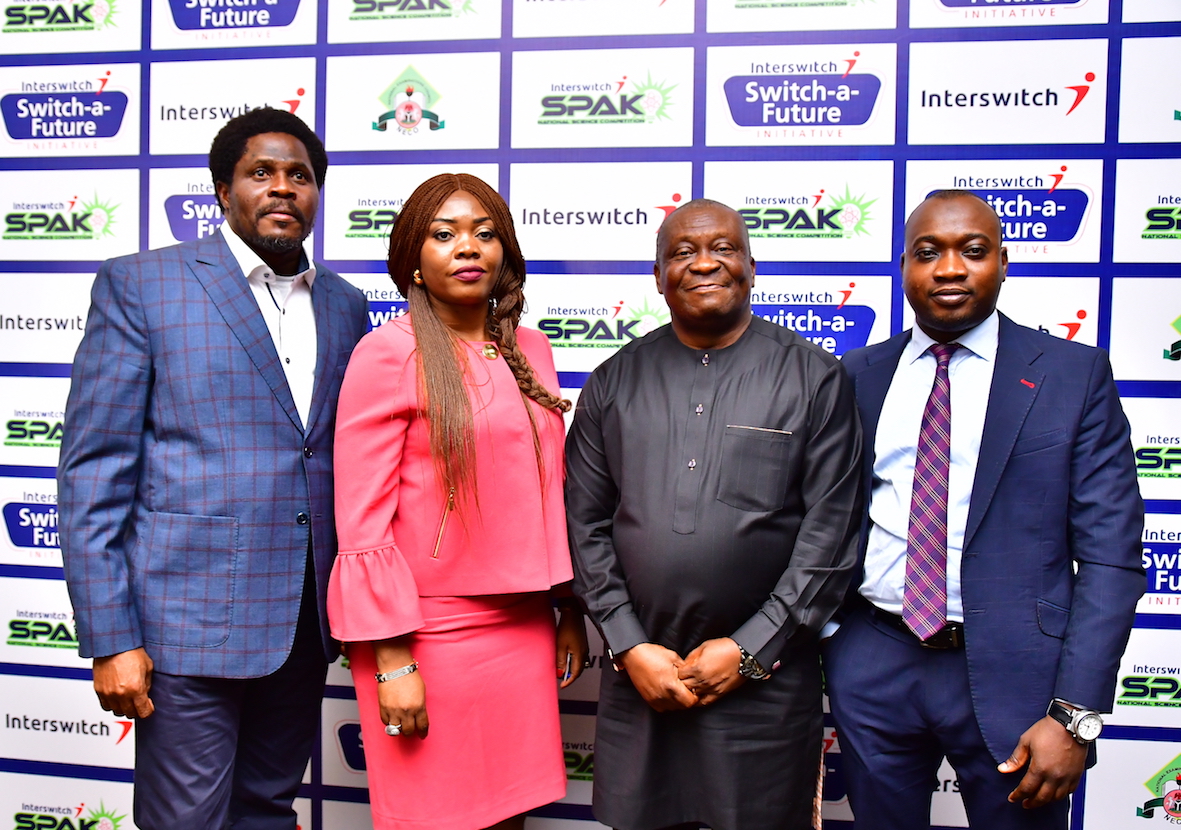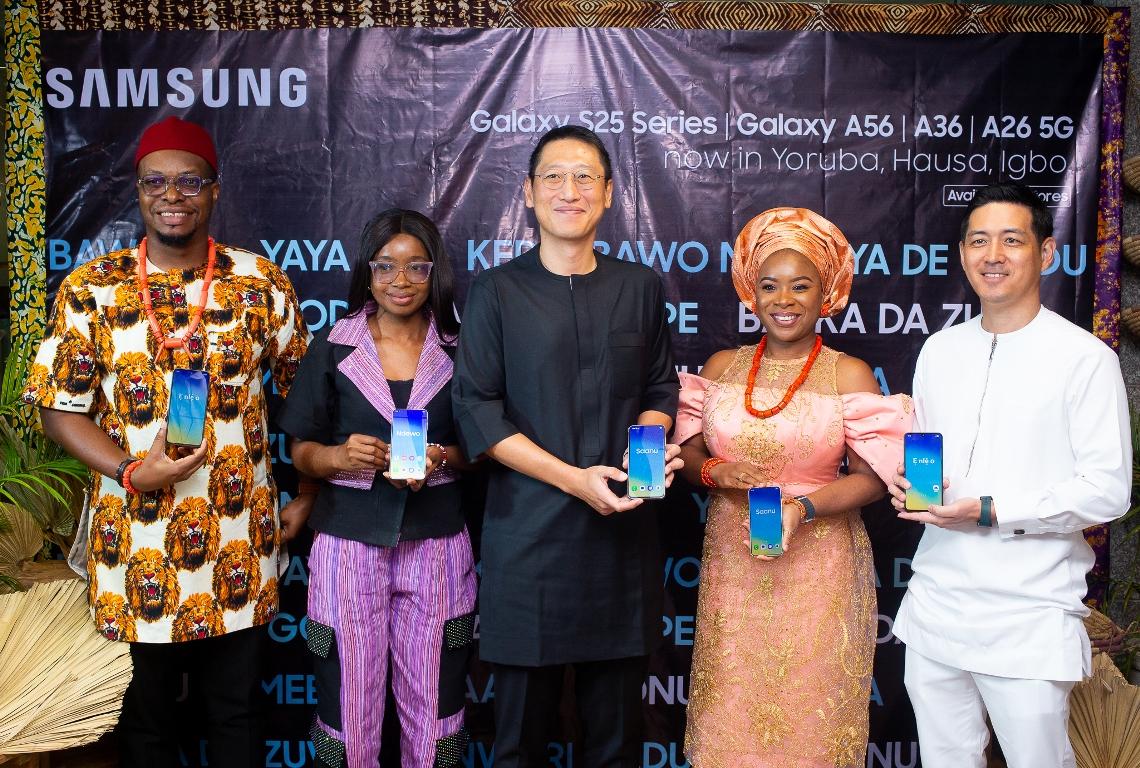Telecom
Interswitch Moves to Resuscitate Nigeria’s Education System – Introduces SPAK Initiative for STEM Grooming

Interswitch has just recorded a major milestone in Nigeria’s education system with the launch of its SPAK national science competition to re-ignite the importance STEM subjects for Nigerian youths.
SPAK; an acronym for Speed, Precision, Accuracy and Knowledge, revolves around key value areas necessary for a progressive future in today’s knowledge based society.
STEM which stands for Science, Technology, Engineering and Mathematics – education has suffered massive decline in Nigeria, leaving our youths poorly equipped for the future tasks necessary for self fulfillment and nation building.
With the goal of encouraging theoretical learning of STEM subjects, rewarding excellence and providing opportunities for developing innovative solutions for societal problems, the competition is open to students in year 11 and all schools nationwide are encouraged to register their best students in STEM subjects.
Speaking at the launch event, Cherry Eromosele, Chief Marketing Officer, Interswitch, said; “SPAK as we have termed it, is a distinctive concept under the Interswitch “Switch A Future” initiative.
“As a mix of education, technology and entertainment which align with Interswitch’s fundamental values of excellence and innovation, this initiative is designed to identify, promote and spark the right support and reward for STEM students and stakeholders.
“For our youth to succeed in today’s knowledge-based economy; they need to acquire the right skill set, their minds need to be re-engineered and reconciled with STEM education in order to compete in or create a job market.”
She revealed that the top 2 students will be awarded a 5-year scholarship, a mac laptop and gold trophy; and a 3-year scholarship, a laptop and a silver trophy accordingly while the third will receive a 2 year scholarship, a laptop, and a bronze trophy.
In addition to these, all 3 winners are guaranteed immediate employment at Interswitch upon graduation.
“We are committed to building a brighter future for the Nigerian child, and we are firm believers in the Nigerian dream. It is up to us to push this country to the forefront of science, technology, engineering and mathematical development and invention.” she added.
According to a recent WEF research, by 2030, more than half of the jobs in the world will be STEM based.
Thinking ahead, Interswitch is thus making a conscious attempt to promote education and technology in Nigeria and to equip the younger generation for the future.
Telecom
Mafab Communications Has Launched 5G Services- Findings

Contrary to media some media reports yesterday, Mafab Communications, one of the companies granted Fifth Generation (5G) licences by Nigerian Communications Commission (NCC) has actually rolled out its 5G network services in Abuja since 2023.

According to Nigeria CommunicationsWeek findings, the rollout came almost a year since the telco paid $273.6 million for spectrum in the 3.5GHz band as part of a government auction.
Mafab Communications, has, not however kept to its promise to to strengthen its commercial operations by March 2025 as its services has remained skeletal since the media launch.
It said that it will roll out its high-speed 5G services through 102 operational sites strategically located in Kano and Abuja but that did not happen as at close of March.
An insider in the company, however assured that starting this month, subscribers with Mafab’s 5G routers will be able to enjoy ultra-fast connectivity on its expanding network.
This move aims to capture a wider share of Nigeria’s growing demand for 5G services.
Dr Musbahu Bashir, founder and chairman, Mafab Communications, said during the rollout launch that the telco will offer both voice and data services nationwide.
Additionally, Nigerian cities like Lagos, Port Harcourt, Enugu, Kano, and Kaduna have been listed for the deployment of 5G services while those not on the list will have services deployed at a later stage.
“The rollout of Mafab Communications 5G network is the beginning of immense opportunities for the country as it represents Nigeria’s capabilities and infinite possibilities,” he said.
“The prospect of increased job opportunities as a consequence of the value-chain benefits the technology will generate and offer is the dream we have all gathered here to launch today,” Bashir continued.
Telecom
Samsung Introduces Local Nigerian Languages to Galaxy Devices, Celebrating Cultural Diversity

Samsung Electronics has taken a bold step in enhancing user experience and inclusivity by introducing Hausa, Igbo, and Yoruba as official language options on selected Samsung Galaxy devices.

L-R: Stephen Okwara, Head, Product Management, Mobile Experience, Samsung Electronics West Africa; Joy Tim-Ayoola, Group Head, Mobile Experience, Samsung Electronics West Africa; Tae Sun Lee, Samsung Electronics West Africa CEO; Oge Maduagwu, Head of Marketing Samsung Electronics West Africa, and Nathan Lee, Regional Business Lead, Mobile Experience, Samsung Electronics West Africa, at the launch of Nigeria local language integration on Galaxy S25, A56, A36, and A26 devices, on April 03, 2025.
The feature, which is now available on the Galaxy S25, A56, A36, and A26 devices, reaffirms Samsung’s commitment to delivering innovative technology that speaks the language of its users.
With this groundbreaking update, Samsung users across Nigeria can now navigate their smartphones in their preferred local language, making technology more accessible, while also upholding our cultural heritage.
A Celebration of Culture and Technology
To mark the launch, Samsung hosted a cultural-themed press briefing featuring traditional music, local cuisine, and a showcase of the new language feature. Employees and guests attended in traditional Yoruba, Igbo, and Hausa attires, celebrating Nigeria’s rich cultural diversity.
Samsung also announced plans to expand local language support to more devices in the near future, reinforcing its dedication to making technology more inclusive for African users.
Empowering Users Through Language
The integration of Hausa, Igbo and Yoruba on Samsung devices reflects the brand’s mission to bridge the digital gap and enhance user engagement. Speaking at the press conference, Oge Maduagwu, Head of Marketing, Samsung Electronics West Africa, said, “At Samsung, we understand that technology is most powerful when it is accessible to all.
“By incorporating our local Nigerian languages, we are making our devices more intuitive and relatable, ensuring that millions of Nigerians can interact with their smartphones in the language they love and understand best”.
Seamless Language Transition on Galaxy Devices
Stephen Okwara, Head of Product Management, Samsung Electronics West Africa added, “The new local language feature is designed to deliver a seamless user experience, allowing customers to easily switch between languages. Users can activate Hausa, Igbo, or Yoruba on the Galaxy S25, A26, A36, and A56 by navigating to: Settings > Language & Input > Select Language
“This update enhances smartphone usability, particularly for those who prefer their native language over English, ensuring greater digital inclusivity, enhancing digital literacy and encouraging more users to engage with technology in their native tongues” He concluded.
Availability
Customers can visit all Samsung Experience Stores or authorized retailers in Nigeria to learn more and experience the feature firsthand.
Telecom
Sophos Reveals Key Findings: 56% of Cyberattacks Exploit Valid Credentials

Sophos, a global leader of innovative security solutions for defeating cyberattacks, has released the 2025 Sophos Active Adversary Report, which details attacker behaviour and techniques from over 400 Managed Detection and Response (MDR) and Incident Response (IR) cases in 2024.

The report found that the primary way attackers gained initial access to networks (56% of all cases across MDR and IR) was by exploiting external remote services, which includes edge devices such as firewalls and VPNs, by leveraging valid accounts.
The combination of external remote services and valid accounts aligns with the top root causes of attacks. For the second year in row, compromised credentials were the number one root cause of attacks (41% of cases). This was followed by exploited vulnerabilities (21.79%) and brute force attacks (21.07%).
Understanding The Speed of Attacks
When analyzing MDR and IR investigations, the Sophos X-Ops team looked specifically at ransomware, data exfiltration, and data extortion cases to identify how fast attackers progressed through the stages of an attack within an organization. In those three types of cases, the median time between the start of an attack and exfiltration was only 72.98 hours (3.04 days). Furthermore, there was only a median of 2.7 hours from exfiltration to attack detection.
“Passive security is no longer enough. While prevention is essential, rapid response is critical. Organizations must actively monitor networks and act swiftly against observed telemetry. Coordinated attacks by motivated adversaries require a coordinated defense. For many organizations, that means combining business-specific knowledge with expert-led detection and response. Our report confirms that organizations with proactive monitoring detect attacks faster and experience better outcomes,” said John Shier, field CISO.
Other Key Findings from the 2025 Sophos Active Adversary Report:
· Attackers Can Take Control of a System in Just 11 Hours: The median time between attackers’ initial action and their first (often successful) attempt to breach Active Directory (AD) – arguably one of the most important assets in any Windows network – was just 11 hours. If successful, attackers can more easily take control of the organization.
· Top Ransomware Groups in Sophos Cases: Akira was the most frequently encountered ransomware group in 2024, followed by Fog and LockBit (despite a multi-government takedown of LockBit earlier in the year).
· Dwell Time is Down to Just 2 Days: Overall, dwell time – the time from the start of an attack to when it is detected – decreased from 4 days to just 2 in 2024, largely due to the addition of MDR cases to the dataset.
· Dwell Time in IR Cases: Dwell time remained stable at 4 days for ransomware attacks and 11.5 days for non-ransomware cases.
· Dwell Time in MDR Cases: In MDR investigations, dwell time was only 3 days for ransomware cases and just 1 day for non-ransomware cases, suggesting MDR teams are able to more quickly detect and respond to attacks.
Ransomware Groups Work Overnight: In 2024, 83% of ransomware binaries were dropped outside of the targets’ local business hours.
· Remote Desktop Protocol Continues to Dominate: RDP was involved in 84% of MDR/IR cases, making it the most frequently abused Microsoft tool.
To shore up their defenses, Sophos recommends that companies do the following:
· Close exposed RDP ports
· Use phishing-resistant multifactor authentication (MFA) wherever possible
· Patch vulnerable systems in a timely manner, with a particular focus on internet-facing devices and services
· Deploy EDR or MDR and ensure it is proactively monitored 24/7
· Establish a comprehensive incident response plan and test it regularly through simulations or tabletop exercises
Read the full It Takes Two: The 2025 Sophos Active Adversary Report on Sophos.com.

 Telecom3 days ago
Telecom3 days agoMTN Denies Data Theft Allegations, Says no Financial Incentive to Do So

 Telecom3 days ago
Telecom3 days agoVitel Wireless, Nigeria’s First MVNO to Launch Operations This Quarter

 E-Financial3 days ago
E-Financial3 days agoFG Asks World Bank for Fresh $10.50m Loan to Enhance CBN Technical Capacity

 Telecom2 days ago
Telecom2 days agoMafab Communications Has Launched 5G Services- Findings

 Broadcasting2 days ago
Broadcasting2 days agoBurna Boy, Other Nigerian Artists Pocket $38m from Spotify in 2024

 Telecom2 days ago
Telecom2 days agoSophos Reveals Key Findings: 56% of Cyberattacks Exploit Valid Credentials

 Telecom3 days ago
Telecom3 days agoTop Nigerian Journalists to Share Insights On MTN MIP This Friday

 E-Business2 days ago
E-Business2 days agoEquinix Launches LG2.3 Data Centre in Nigeria






















